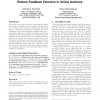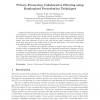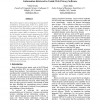181 search results - page 10 / 37 » Using User Preferences to Enhance Privacy in Pervasive Syste... |
CORR
2011
Springer
12 years 10 months ago
2011
Springer
In this paper, we study methods for improving the utility and privacy of reputation scores for online auctions, such as used in eBay, so as to reduce the effectiveness of feedbac...
CHI
2007
ACM
14 years 7 months ago
2007
ACM
Domestic ubiquitous computing systems often rely on inferences about activities in the home, but the open-ended, dynamic and heterogeneous nature of the home poses serious problem...
ICDM
2003
IEEE
14 years 10 days ago
2003
IEEE
Collaborative Filtering (CF) techniques are becoming increasingly popular with the evolution of the Internet. E-commerce sites use CF systems to suggest products to customers base...
ETRICS
2006
13 years 10 months ago
2006
Recommender systems are widely used to help deal with the problem of information overload. However, recommenders raise serious privacy and security issues. The personal information...
WEBI
2005
Springer
14 years 16 days ago
2005
Springer
We present a generic natural language processing (NLP) architecture, acronym QTIL, based on a system of cooperating multiple agents (Q/A, T, I, and L agents) which can be used in ...



